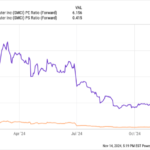China, with its formidable tech crackdown and tumultuous relationship with the U.S., has been a tricky terrain for investors lately. However, a glimmer of hope has emerged with the aid of a colossal stimulus package from the Chinese government. This resurgence has fueled renewed interest in established tech giants like Alibaba and Baidu Inc.
But amidst this resurgence, investors are left pondering – which of these two behemoths should they set their sights on? Let’s delve into the heart of this matter.

Image source: Getty Images.
The Evolution of Tech Titans
Ahead of the pack, Alibaba and Baidu stand as first-generation tech titans in China, having weathered storms and evolved over the last two decades into colossal tech conglomerates.
Alibaba, initially an e-commerce player, has gracefully extended its reach into various industries such as fintech (Ant Group), cloud computing (Alibaba Cloud), logistics (Cainiao), local services, and entertainment. Its premier platforms, Taobao and Tmall, dominate China’s e-commerce landscape, with Alibaba Cloud reigning as China’s supreme cloud service provider.
Beyond its e-commerce and cloud supremacy, Alibaba’s empire harbors lesser-known, yet equally significant, players like Cainiao Logistics – a global logistical powerhouse servicing over 200 countries. Alibaba’s influence transcends China, with a strong foothold in Turkey and Southeast Asia. In essence, while Alibaba may have sprung from Chinese soil, it now looms as a global tech entity.
On the other hand, Baidu, originating as a search engine service provider, has embarked on diversification into AI Cloud, autonomous driving, and entertainment realms. The Baidu App boasts a staggering 703 million monthly active users, encompassing almost half the Chinese populace. Dominant in China’s search engine sphere, Baidu’s revenue streams predominantly arise from advertising and marketing endeavors, which have been conscientiously funneled into propelling auxiliary ventures like AI Cloud and autonomous driving.
Charting the Course for Alibaba and Baidu
These tech juggernauts, Alibaba and Baidu, emerge as disparate entities with distinctive business models and divergent prospects.
Alibaba, facing an uphill battle in safeguarding its e-commerce supremacy in China, feels the burgeoning menace from more agile competitors like Pinduoduo and Douying. Alibaba’s prior business sprawl has somewhat diluted its focus, yet under the new CEO’s guidance, the company is realigning its priorities. Encouragingly, recent quarters have witnessed growth spikes in gross merchandise value (GMV) and orders.
While Alibaba’s domestic e-commerce sector grapples with challenges, segments like Alibaba Cloud, Cainiao, and overseas e-commerce hold promise for rapid expansion. Notably, Alibaba Cloud stands to gain from the cloud migration spree and the escalating adoption of artificial intelligence (AI) in commercial spheres. Pertinently, the latest quarterly revenues of public cloud and AI-related products recorded notable double and triple-digit growths, respectively.
Furthermore, Alibaba’s international e-commerce wing soared with a robust 32% revenue surge, while Cainiao witnessed a commendable 16% year-over-year growth. Despite outgrowing its historical growth pace due to its enormity, Alibaba remains poised to surge ahead moderately, leveraging China’s economic upsurge and the ascent of nascent business offshoots.
Correspondingly, Baidu grapples with hurdles in fueling growth for its core advertising operations amidst the ascendance of competing platforms like Douying and Kuaishou. Online marketing revenues plummeted by 2% in the most recent quarter, although this decline was cushioned by a 10% upward surge in non-marketing revenues. Fortunately, Baidu’s advertising sector sustains robust profitability, empowering the redirection of resources into burgeoning domains like AI Cloud.
Baidu’s autonomous driving sphere, Apollo Go, unfolds a tale of promise, having already showcased notable achievements attributable to substantial past investments. Notably, the ride-hailing arm aggregated an impressive 899,000 rides during the second quarter of 2024, scaling its cumulative ride count to over 7 million. While the fruition of these fledgling ventures is uncertain, their success could potentially yield substantial value for shareholders down the road.
Implications for Investors
In this tug of war, a definitive victor remains elusive. Alibaba, with its diverse e-commerce portfolio and budding growth avenues both in China and abroad, stands tall. Conversely, Baidu, primarily fixated on China, shines bright with expansive prospects if it manages to maneuver its significant stakes in AI Cloud and autonomous driving.
Ultimately, investor decisions should be anchored on their expertise and faith in the future growth trajectories of these corporate juggernauts.





